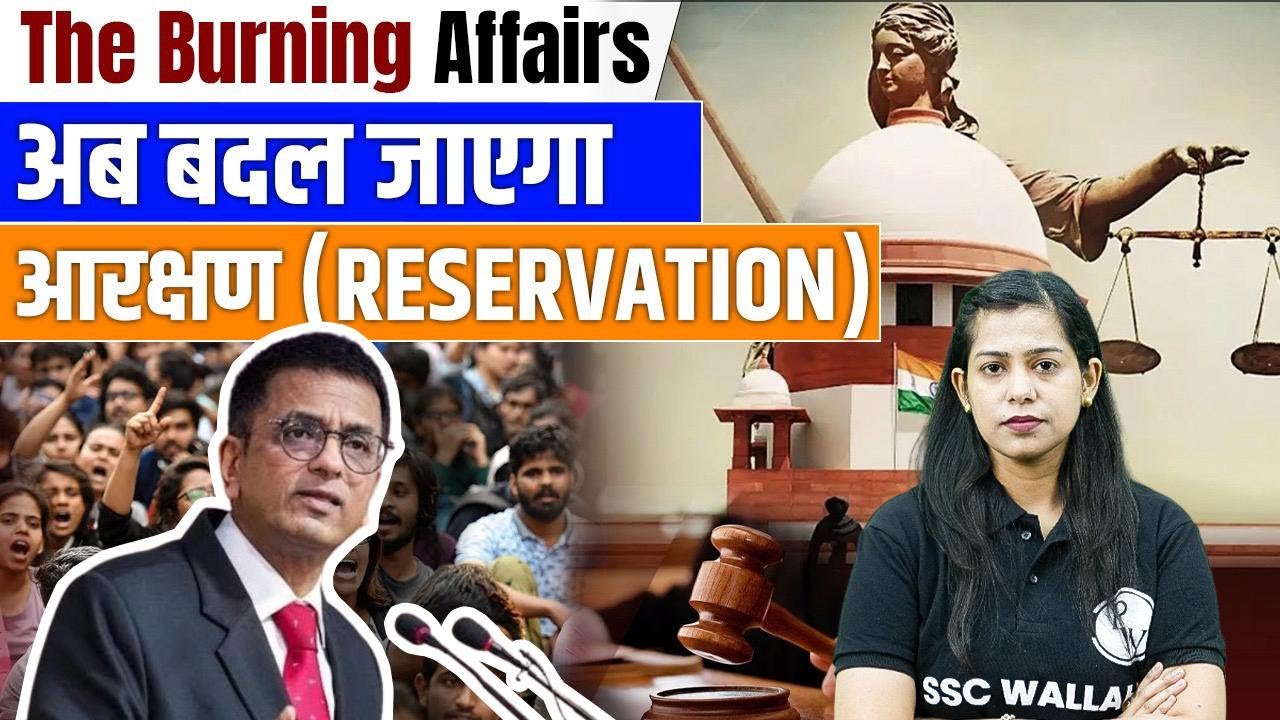SC verdict on SC/ST reservation : What are the political implications?
Summary
TLDRIn this episode of 'Talking Politics,' the focus is on the Indian Supreme Court's recent verdict allowing state governments to subclassify scheduled casts for more preferential treatment. The judgment suggests excluding the 'creamy layer' from reservation benefits to ensure real equality. The impact of this decision on Indian politics is explored, including potential strategies for political parties and the challenges of implementing the 'creamy layer' concept within scheduled cast communities.
Takeaways
- 🏛️ The Supreme Court of India ruled that state governments have the right to subclassify scheduled casts to provide more preferential treatment in public employment and education.
- 👨⚖️ Four judges suggested extending the 'creamy layer' principle to scheduled casts and tribes to exclude affluent individuals from reservation benefits.
- 📜 The verdict indicates a move towards recognizing the internal diversity and inequality within scheduled cast communities.
- 🙅♂️ Justice Chandrachud was silent on the creamy layer opinion but agreed with the states' right to subclassify.
- 🗣️ Justice BR Gait dissented, arguing that states do not have the power to alter the presidential list of scheduled casts and tribes.
- 📊 The court emphasized the need for empirical data to justify subclassifying a group within scheduled casts as requiring more benefits.
- 🚫 The judgment overruled a 2005 verdict, allowing states to subclassify without violating the constitutional provision that rests with Parliament.
- 🔄 The political impact of this verdict is complex and may lead to strategic realignment of political parties to appeal to specific sub-groups within the scheduled cast communities.
- 🔍 The creamy layer concept, if applied to scheduled casts, presents a significant ideological and administrative challenge for political parties.
- ⏳ The verdict's implications for politics and policy are significant and will require careful consideration and political will to implement effectively.
Q & A
What was the main verdict of the Supreme Court regarding the subclassification of Scheduled Castes?
-The Supreme Court ruled that state governments have the right to subclassify Scheduled Castes notified in the presidential list to provide them more preferential treatment in public employment and education than other communities.
What is the 'creamy layer' principle mentioned in the script?
-The 'creamy layer' principle refers to the concept of excluding affluent individuals or families from the benefits of reservation to make room for the really underprivileged within these classes.
Which judges supported the idea of considering a 'creamy layer' within the Scheduled Castes?
-Justice BR Gait and three other judges, Justices Vikram Pankaj M, and Saish Chandra Sharma, supported the idea of considering a 'creamy layer' within the Scheduled Castes.
What was the dissenting opinion regarding the subclassification of Scheduled Castes?
-Justice Bavredi was the dissenting member who argued that states did not have the power to tinker with the presidential list of Scheduled Castes and Scheduled Tribes.
How does the Supreme Court's verdict impact the political landscape in India?
-The verdict could lead to a more nuanced approach to reservations, potentially breaking the monopoly over the political support of these communities from an umbrella alliance to aggregating individual communities.
What was the previous stance on subclassification as per the 2005 E.V. Chinnaiah judgment?
-The 2005 E.V. Chinnaiah judgment held that subclassification amounted to tinkering with the presidential list by the state legislature and was therefore violative of Article 3412.
What does the Supreme Court's verdict mean for the states in terms of reservation policies?
-The verdict empowers state governments to subcategorize Scheduled Castes within their reservation policies, potentially leading to more targeted and equitable distribution of benefits.
What is the potential challenge for political parties in implementing the 'creamy layer' concept for Scheduled Castes?
-The challenge lies in the ideological and practical leap required to apply the 'creamy layer' concept to Scheduled Castes, which traditionally face a different level of deprivation compared to Other Backward Classes.
How might the verdict influence future electoral strategies of political parties?
-Political parties may need to reconsider their electoral strategies by focusing on specific subcategories within Scheduled Castes to garner support, rather than relying on a broad umbrella approach.
What administrative challenges does the verdict pose for state governments?
-State governments will face the challenge of collecting empirical data to support claims for subclassification and ensuring that the process of identifying the 'creamy layer' is fair and effective.
How did the verdict come about, and what were the legal considerations?
-The verdict was the result of a reference made by a seven-judge bench in 2020 to examine the constitutionality of certain state reservation acts. The court considered the need for acknowledging and remedying inter-inequality among Scheduled Castes, as well as the potential for political tinkering.
Outlines

Dieser Bereich ist nur für Premium-Benutzer verfügbar. Bitte führen Sie ein Upgrade durch, um auf diesen Abschnitt zuzugreifen.
Upgrade durchführenMindmap

Dieser Bereich ist nur für Premium-Benutzer verfügbar. Bitte führen Sie ein Upgrade durch, um auf diesen Abschnitt zuzugreifen.
Upgrade durchführenKeywords

Dieser Bereich ist nur für Premium-Benutzer verfügbar. Bitte führen Sie ein Upgrade durch, um auf diesen Abschnitt zuzugreifen.
Upgrade durchführenHighlights

Dieser Bereich ist nur für Premium-Benutzer verfügbar. Bitte führen Sie ein Upgrade durch, um auf diesen Abschnitt zuzugreifen.
Upgrade durchführenTranscripts

Dieser Bereich ist nur für Premium-Benutzer verfügbar. Bitte führen Sie ein Upgrade durch, um auf diesen Abschnitt zuzugreifen.
Upgrade durchführenWeitere ähnliche Videos ansehen

Breaking News : Supreme Court Calls for Major Overhaul of SC/ST Reservation Policy | By Krati Mam

2024 Important Legal Current Affairs | August 2024

Supreme Court Approves Sub-Classification for SCs and STs, Overrules 2004 Verdict | UPSC

Today's Stock Market News - 23/09/2024 | Aaj ki Taaza Khabar | Parimal Ade

Article 26 of Indian Constitution Part1

Proposes Exclusion of Creamy Layer Among SC/STs from Reservations | Know all about it | UPSC
5.0 / 5 (0 votes)
